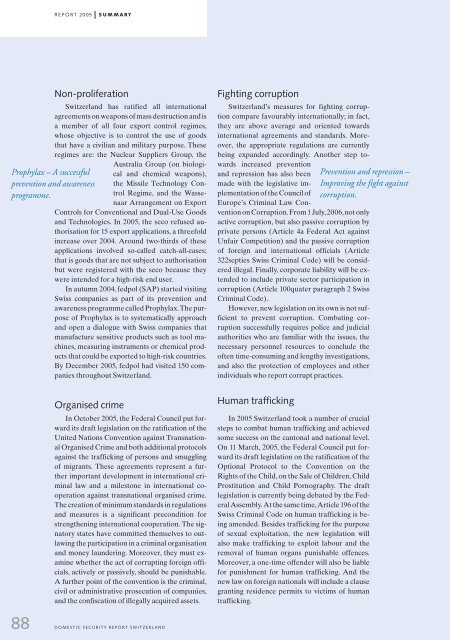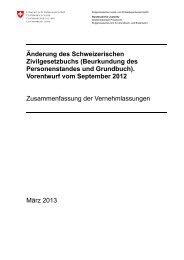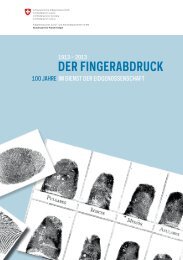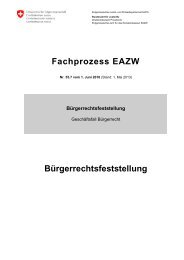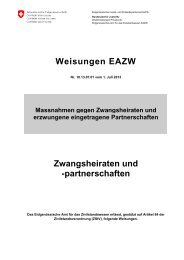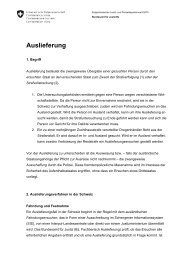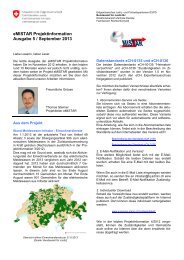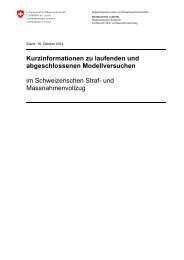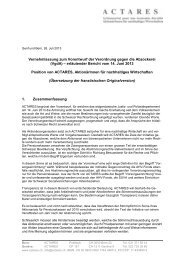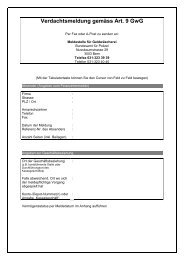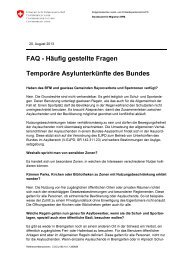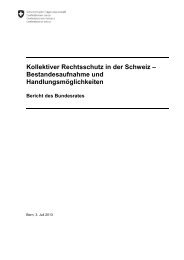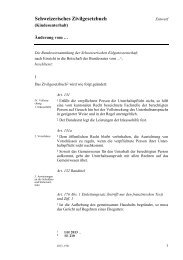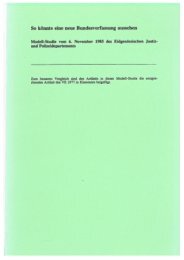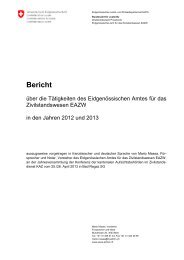BERICHT INNERE SICHERHEIT DER SCHWEIZ ... - EJPD - admin.ch
BERICHT INNERE SICHERHEIT DER SCHWEIZ ... - EJPD - admin.ch
BERICHT INNERE SICHERHEIT DER SCHWEIZ ... - EJPD - admin.ch
Erfolgreiche ePaper selbst erstellen
Machen Sie aus Ihren PDF Publikationen ein blätterbares Flipbook mit unserer einzigartigen Google optimierten e-Paper Software.
88<br />
REPORT 2005 SUMMARY<br />
Non-proliferation<br />
Prophylax – A successful<br />
prevention and awareness<br />
programme.<br />
Switzerland has ratified all international<br />
agreements on weapons of mass destruction and is<br />
a member of all four export control regimes,<br />
whose objective is to control the use of goods<br />
that have a civilian and military purpose. These<br />
regimes are: the Nuclear Suppliers Group, the<br />
Australia Group (on biological<br />
and <strong>ch</strong>emical weapons),<br />
the Missile Te<strong>ch</strong>nology Control<br />
Regime, and the Wassenaar<br />
Arrangement on Export<br />
Controls for Conventional and Dual-Use Goods<br />
and Te<strong>ch</strong>nologies. In 2005, the seco refused authorisation<br />
for 15 export applications, a threefold<br />
increase over 2004. Around two-thirds of these<br />
applications involved so-called cat<strong>ch</strong>-all-cases;<br />
that is goods that are not subject to authorisation<br />
but were registered with the seco because they<br />
were intended for a high-risk end user.<br />
In autumn 2004, fedpol (SAP) started visiting<br />
Swiss companies as part of its prevention and<br />
awareness programme called Prophylax.The purpose<br />
of Prophylax is to systematically approa<strong>ch</strong><br />
and open a dialogue with Swiss companies that<br />
manufacture sensitive products su<strong>ch</strong> as tool ma<strong>ch</strong>ines,<br />
measuring instruments or <strong>ch</strong>emical products<br />
that could be exported to high-risk countries.<br />
By December 2005, fedpol had visited 150 companies<br />
throughout Switzerland.<br />
Organised crime<br />
In October 2005, the Federal Council put forward<br />
its draft legislation on the ratification of the<br />
United Nations Convention against Transnational<br />
Organised Crime and both additional protocols<br />
against the trafficking of persons and smuggling<br />
of migrants. These agreements represent a further<br />
important development in international criminal<br />
law and a milestone in international cooperation<br />
against transnational organised crime.<br />
The creation of minimum standards in regulations<br />
and measures is a significant precondition for<br />
strengthening international cooperation. The signatory<br />
states have committed themselves to outlawing<br />
the participation in a criminal organisation<br />
and money laundering. Moreover, they must examine<br />
whether the act of corrupting foreign officials,<br />
actively or passively, should be punishable.<br />
A further point of the convention is the criminal,<br />
civil or <strong>admin</strong>istrative prosecution of companies,<br />
and the confiscation of illegally acquired assets.<br />
DOMESTIC SECURITY REPORT SWITZERLAND<br />
Fighting corruption<br />
Switzerland’s measures for fighting corruption<br />
compare favourably internationally; in fact,<br />
they are above average and oriented towards<br />
international agreements and standards. Moreover,<br />
the appropriate regulations are currently<br />
being expanded accordingly. Another step to-<br />
wards increased prevention<br />
and repression has also been<br />
made with the legislative implementation<br />
of the Council of<br />
Europe’s Criminal Law Con-<br />
vention on Corruption.From 1 July,2006,not only<br />
active corruption, but also passive corruption by<br />
private persons (Article 4a Federal Act against<br />
Unfair Competition) and the passive corruption<br />
of foreign and international officials (Article<br />
322septies Swiss Criminal Code) will be considered<br />
illegal. Finally, corporate liability will be extended<br />
to include private sector participation in<br />
corruption (Article 100quater paragraph 2 Swiss<br />
Criminal Code).<br />
However, new legislation on its own is not sufficient<br />
to prevent corruption. Combating corruption<br />
successfully requires police and judicial<br />
authorities who are familiar with the issues, the<br />
necessary personnel resources to conclude the<br />
often time-consuming and lengthy investigations,<br />
and also the protection of employees and other<br />
individuals who report corrupt practices.<br />
Human trafficking<br />
Prevention and repression –<br />
Improving the fight against<br />
corruption.<br />
In 2005 Switzerland took a number of crucial<br />
steps to combat human trafficking and a<strong>ch</strong>ieved<br />
some success on the cantonal and national level.<br />
On 11 Mar<strong>ch</strong>, 2005, the Federal Council put forward<br />
its draft legislation on the ratification of the<br />
Optional Protocol to the Convention on the<br />
Rights of the Child, on the Sale of Children, Child<br />
Prostitution and Child Pornography. The draft<br />
legislation is currently being debated by the Federal<br />
Assembly.At the same time,Article 196 of the<br />
Swiss Criminal Code on human trafficking is being<br />
amended. Besides trafficking for the purpose<br />
of sexual exploitation, the new legislation will<br />
also make trafficking to exploit labour and the<br />
removal of human organs punishable offences.<br />
Moreover, a one-time offender will also be liable<br />
for punishment for human trafficking. And the<br />
new law on foreign nationals will include a clause<br />
granting residence permits to victims of human<br />
trafficking.


